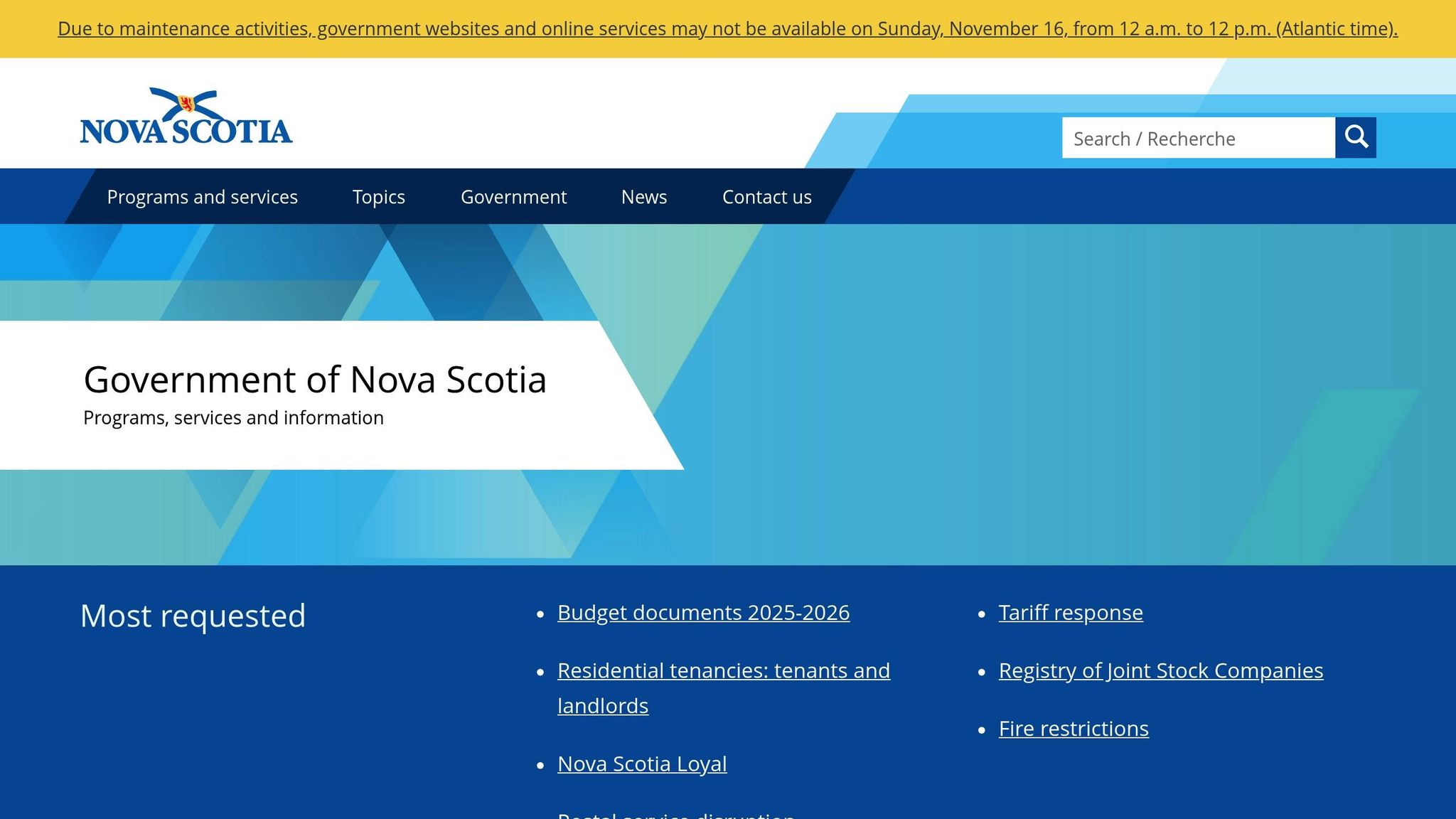-
Mandatory Registration: As of September 30, 2024, all STR operators in Nova Scotia must register under the Short-term Rentals Registration Act (STRRA). Fines for non-compliance range from $1,000 to $100,000.
- Fees: $50/year for primary residences; $240–$2,000/year for commercial properties.
- Registration includes municipal bylaw compliance.
-
New Municipal Rules: Annapolis City Council introduced a 10% block limit for STRs in October 2025.
- Whole-home rentals must follow this cap.
- Owner-occupied rentals are exempt.
- Current licences are valid until November 2027; new licences will use a lottery system.
-
Taxes & Fees:
- STR income is taxable as business income and subject to 15% HST.
- Additional municipal fees apply: $50/year for primary residences; $500/year for commercial STRs.
- Safety Standards: STRs must meet strict safety requirements, including smoke detectors, carbon monoxide detectors, and fire extinguishers. Violations can result in fines up to $100,000.
- Market Trends: STRs represent 2.9% of Annapolis housing, with average earnings of $10,000/year. Daily rates are expected to increase by 2.7% in 2025.
Key Takeaway: Compliance with both provincial and municipal rules is critical to avoid fines and ensure your STR operates legally.
Nova Scotia's New STR Regulations: What Hosts Need to Know by September 30th!

Municipal Zoning and Bylaw Changes for STRs
In the Annapolis Valley, municipal governments have introduced zoning changes that directly impact where short-term rentals (STRs) can operate.
Back in October 2025, the Annapolis City Council passed a new ordinance limiting STRs to no more than 10% of any given block. With over 500 STR units currently listed in Annapolis - and only about half of them properly licensed - this regulation aims to address growing concerns about the effects of vacation rentals on local neighbourhoods[2]. Below, we break down the zoning rules and enforcement measures that come with this ordinance.
Zoning Rules: Owner-Occupied vs. Whole-Unit Rentals
The new policy draws a clear line between owner-occupied rentals and whole-unit properties. If you rent out rooms in your home while living on-site, you’re exempt from the 10% block limit. However, whole-unit rentals must comply with this restriction. This distinction reflects the reality that nearly 99% of short-term stays last between one and seven nights, a trend that has heavily influenced municipal planning decisions[2].
With these zoning rules in place, let’s explore how the city ensures compliance.
Recent Bylaw Changes and How They're Enforced
To reinforce the new regulations, Annapolis has adopted stricter enforcement measures. Complaints from residents drive the process: the Office of Planning and Zoning investigates reported violations and can impose fines of up to CA$1,000 per day for unregistered STRs[2]. Additionally, a lottery system has been introduced to manage the 10% limit, giving priority to current licence holders and local landlords when allocating licences.
While the registration fee is relatively low - just CA$100 for a two-year licence - the penalties for non-compliance are steep[5]. Enforcement efforts focus on areas with frequent complaints, ensuring properties that draw repeated concerns receive closer attention.
During the ordinance discussions, Ward 1 Alderman Harry Huntley summed up the council’s position:
"We needed that, because short term rentals can be part of our community, but they can't be all of our community, or we won't have a community."[2]
Provincial Registration and Licensing Steps
After meeting municipal requirements, the next step for short-term rental (STR) hosts in the Annapolis Valley is to register with Nova Scotia's provincial system under the Short-term Rentals Registration Act. This became a legal requirement on September 30, 2024, for any accommodations rented out for 28 days or less [7]. While the process is straightforward, operating without registration can lead to steep fines.
Required Registration Steps
To register, you'll need the following:
- Your legal and business names
- The street address of your rental property
- The number of bedrooms available for rent
- Proof of compliance with municipal bylaws.
For whole-home rentals, you must also provide two documents proving primary residence (e.g., a driver’s licence or tax return). Renters need to include written consent from the property owner or condo board. The province categorizes STR hosts into three groups:
- Whole Home Primary Residence Short-term Rental Host
- Commercial Short-term Rental Host
- Traditional Tourist Accommodation Host
The registration process involves filling out an online form and submitting all required documents. Once your application is reviewed, you'll receive instructions for payment. Fees vary based on your host type and location:
- CA$50 annually for primary residence hosts.
- CA$500 annually for commercial hosts in the Annapolis Valley (classified as Tier 2).
- Traditional tourist accommodations pay CA$50 for 1–4 bedrooms or CA$150 for 5 or more bedrooms.
Once payment is processed, your registration number will be emailed to you. This number is mandatory for advertising your rental. Registration must be renewed annually by April 1st, and any changes to your rental must be reported within 10 days [7].
Penalties for Non-Compliance
The province takes registration enforcement seriously, with stiff penalties for those who fail to comply. By July 23, 2024, 7,193 short-term rentals had already registered in Nova Scotia, reflecting broad adherence to the new rules [4]. However, for those who operate without a valid registration, the consequences are severe.
"Operating without a valid registration number is an offence. Beginning September 30, 2024, fines will range from $1,000 per offence to a maximum of $100,000." – Government of Nova Scotia [1]
Fines start at CA$1,000 per offence and can climb as high as CA$100,000 for serious or repeat violations [1]. Highlighting the rationale behind these regulations, Minister of Municipal Affairs and Housing John Lohr stated:
"Nova Scotians need housing. We know many houses and apartments that could potentially be long-term homes are being rented short term." – Minister John Lohr [4]
The deadline for registration for the 2024/25 season was September 16, 2024, allowing hosts time to complete their applications before enforcement began [4].
Tax and Financial Requirements for STR Hosts
Running a short-term rental (STR) in the Annapolis Valley comes with additional fees and tax responsibilities. Keeping detailed financial records is crucial for staying compliant and ensuring your rental remains profitable. These financial obligations build on the earlier steps of registration and zoning compliance. Let’s take a closer look at the municipal fees and tax rules that apply to STRs in this region.
Municipal Property Taxes and STR Fees
In 2024, a tiered fee structure determines the annual costs for STR hosts based on rental type and location. The Annapolis Valley is classified as Tier 2 for commercial STR operations.
- Whole home primary residence hosts pay an annual registration tax of CA$50.
- Commercial STR hosts in the Annapolis Valley are charged CA$500 annually under Tier 2 classification [7].
For traditional tourist accommodations, fees vary by property size:
- Properties with 1 to 4 bedrooms pay CA$50 annually.
- Properties with 5 or more bedrooms pay CA$150 annually [7].
"The annual registration tax for whole home primary residence short-term rental hosts is $50." – Nova Scotia Government [7]
It’s important to note that these registration taxes are separate from municipal property taxes, which are assessed separately.
HST/GST Requirements and Income Reporting
Beyond registration fees, STR hosts must meet federal and provincial tax requirements, including HST/GST and income reporting.
Short-term rental income is treated as taxable business income by the Canada Revenue Agency (CRA). In Nova Scotia, the combined HST rate is 15% (5% GST and 10% provincial HST), which must be charged to guests and remitted to the CRA.
- You must register for a GST/HST number if your taxable revenues exceed CA$30,000 in a single calendar quarter or over four consecutive quarters.
- Once registered, you’re required to charge HST on all bookings and file regular returns with the CRA.
One benefit of registration is the ability to claim input tax credits for HST paid on eligible expenses. This includes costs like cleaning supplies, maintenance, furniture, and professional services.
For income reporting, STR earnings must be declared as business income on your tax return. This allows you to deduct eligible business expenses, such as:
- Utilities
- Insurance
- Repairs and maintenance
- Cleaning services
- Marketing costs
If you rent out part of your primary residence, you can also claim a portion of your home’s operating costs as deductions.
Tips for Managing STR Finances
To stay organized, maintain thorough records of all STR-related transactions. This includes:
- Booking confirmations
- Cleaning and maintenance receipts
- Utility bills
- Professional service invoices
Consider hiring professional bookkeeping services to help with tasks like monthly data entry, HST remittance preparation, and year-end tax filing. Accurate record-keeping and expert financial support can make managing your STR’s tax obligations much easier.
sbb-itb-b5e1074
Safety Standards and Compliance Requirements
Meeting stringent safety standards is a non-negotiable responsibility for short-term rental (STR) hosts, especially in the Annapolis Valley. These requirements go hand in hand with municipal zoning and licensing rules, ensuring both guest safety and adherence to the law. Regular inspections enforce these standards, with penalties in place for non-compliance. Below, we’ll explore the essential safety measures and inspection protocols every STR host must understand.
Health and Safety Requirements
In Nova Scotia, the Building Code Act and local municipal regulations set the bar for safety in STR properties, focusing heavily on fire prevention, detection, and emergency preparedness.
Fire Safety Equipment is the cornerstone of compliance. STR properties must have:
- Smoke detectors installed on every level and in every bedroom.
- Carbon monoxide detectors placed outside sleeping areas.
- Easily accessible fire extinguishers.
Building Code Compliance goes beyond equipment, ensuring the structural safety of the property. This includes having proper egress windows in basement bedrooms and secure railings on decks and balconies to allow for safe evacuation during emergencies.
To maintain compliance, hosts should routinely test smoke and carbon monoxide detectors, inspect fire extinguishers, and keep detailed maintenance logs. These records can be crucial during official inspections.
"Ensuring that your property meets all safety standards is not just about compliance; it's about providing a safe environment for your guests." – Local Building Inspector, Municipality of the County of Annapolis
Alarmingly, recent data shows that 50% of short-term rentals in the Annapolis Valley are unlicensed, meaning they bypass safety inspections and compliance checks[6].
Inspection Process and Penalties
The inspection process is designed to ensure every STR meets health and safety standards. Local building inspectors conduct thorough evaluations, focusing on fire safety systems, structural integrity, and adherence to building codes.
Inspection Protocols include:
- Verifying the functionality of smoke and carbon monoxide detectors.
- Checking the placement and accessibility of fire extinguishers.
- Ensuring clear egress routes and compliance with occupancy limits.
Penalties for non-compliance are steep. Minor infractions may result in warnings or compliance orders, but serious violations can lead to fines as high as CA$100,000. For example, in 2025, several STR hosts in the Municipality of the County of Annapolis faced hefty penalties for failing to meet fire safety standards.
"Inspections are a matter of safety. They ensure compliance with fire codes, structural integrity, and environmental health." – Gavin Buckley, Mayor of Annapolis[6]
To avoid enforcement actions, hosts should take a proactive approach. Conduct regular self-inspections using the same criteria as official inspections, and maintain detailed records of safety checks.
The need for compliance is growing as municipalities tighten their monitoring efforts. As of August 2025, only 289 STR licences had been issued out of approximately 560 listed properties, leaving many operating without proper licensing or safety checks[6]. Staying updated on changing regulations through local planning and inspection services is critical for maintaining compliance and ensuring guest safety.
Market Trends and Future Policy Changes
New regulations are reshaping the short-term rental (STR) landscape in Annapolis Valley. For hosts, staying compliant and profitable means adapting to these changes effectively.
Market Trends and Host Earnings
Recent regulatory shifts have significantly impacted the STR market across Nova Scotia, with the Annapolis Valley feeling the effects more acutely. Since the implementation of these new rules, over 1,400 short-term rentals have exited the market across the province[9].
In Annapolis, STRs account for 2.9% of housing units - double the national average - highlighting a concentrated market that has drawn attention from local officials and housing advocates.
"Short-term rentals have been seriously draining the long-term residences across the province." - John White, Minister of Housing[9]
For those still in the game, understanding earnings potential is key. The average host in Nova Scotia earns around CA$10,000 annually, often from renting out primary residences or family cottages[9]. In Annapolis Royal, properties generate an average daily rate of CA$144 with a 35.8% occupancy rate[3].
Looking ahead, the market shows signs of growth. Average daily rates are expected to increase by 2.7% in 2025[10]. Meanwhile, demand is shifting towards smaller, unique accommodations in suburban and rural areas, even as urban centres face tighter restrictions[8]. These trends suggest that hosts need to adjust their strategies to align with evolving market and regulatory conditions.
Preparing for Policy Changes
The regulatory landscape is changing quickly, and hosts must be proactive to ensure long-term success. One major factor is the 10% block ordinance, which will increasingly influence licensing and operations.
"We needed that, because short term rentals can be part of our community, but they can't be all of our community, or we won't have a community." - Harry Huntley, Alderman, Annapolis City Council[2]
Under current rules, existing STR licences are valid until November 2027. After that, a lottery system will prioritise local, owner-occupied rentals[2]. This timeline underscores the importance of staying ahead of compliance requirements.
"In order to succeed in today's short-term rental world, owners have to constantly stay up to date and comply with new laws and regulations as they come into effect." - Shannon Casey, Author at LocalVR[12]
Registration fees in Nova Scotia remain relatively low, ranging from CA$50 for primary residence hosts to CA$240–CA$2,000 for commercial operators[11]. While these fees are manageable, non-compliance can result in hefty penalties, making adherence to regulations crucial.
To navigate these changes, hosts must stay informed and connected. Regularly checking municipal websites and joining STR community groups can help owners keep pace with legislative updates. The rapid regulatory shifts - like New York City's September 2023 ban on rentals under 30 days - serve as a reminder of how quickly the landscape can change[12].
Building strong relationships with local property management companies and engaging in public consultations with municipal officials can also provide valuable insights. These connections not only help with compliance but also open avenues for maximising earnings in a shifting market. Staying informed and prepared is the key to thriving in this evolving environment.
Key Points for STR Hosts in the Annapolis Valley
Here’s a concise rundown of the essential regulatory updates for short-term rental (STR) hosts in the Annapolis Valley. Operating an STR here means staying on top of rules that directly impact your business. With regulations shifting frequently, keeping informed is crucial for long-term success.
Zoning compliance is now a critical focus. In October 2025, the Annapolis City Council introduced an ordinance restricting STRs to no more than 10% of any blockface. This change affects several blocks where many units are still unlicensed[2]. Current licences will remain valid until November 2027, but new licences will be issued through a lottery system, prioritizing existing licence holders and local landlords[2].
Registration and licensing are non-negotiable. Under the Short-term Rentals Registration Act, annual registration is mandatory for legal operation in Nova Scotia. Fees depend on the type and use of the property, and penalties for non-compliance range from CA$1,000 to CA$100,000[1][13].
Tax obligations go beyond income reporting. STR hosts must remit HST/GST and pay an additional 8% occupancy tax on rental income. Property tax adjustments may also apply, depending on the STR designation of your property.
Safety standards demand constant attention. Ensure smoke detectors are installed and functional, comply with local building codes, and prepare for regular inspections. Violations can result in suspended licences[13].
Understanding market trends is equally important. Keeping an eye on local pricing and occupancy trends can help you stay competitive. For reference, the average annual earnings for STR hosts in Nova Scotia are about CA$10,000. Additionally, daily rates are expected to rise by 2.7% in 2025, so aligning your pricing strategy with these trends can boost profitability[10].
Staying informed is your best strategy. Check municipal websites regularly, attend council meetings, and engage in public consultations to stay up to date with regulatory changes. As of July 2024, over 7,193 STRs were registered across Nova Scotia, reflecting the high level of scrutiny in this sector[13].
FAQs
How can I make sure my short-term rental meets the latest zoning and registration rules in Annapolis Valley?
To keep your short-term rental in line with current municipal rules, you’ll need to go through the property registration process and confirm that it meets local land use by-laws. This usually means sharing details like your full name, business name (if applicable), the rental property's civic address, and information about the number of bedrooms or units available.
It’s also important to keep an eye on any updates to zoning regulations or registration procedures. Staying informed can help you avoid penalties and ensure your rental operates smoothly within the law.
How will the new 10% cap on short-term rentals in Annapolis affect my current whole-home rental?
The newly introduced 10% cap on short-term rentals restricts these properties to no more than 10% of all homes within a specific area. If your entire home is already licensed as a short-term rental and follows local rules, you might still qualify to operate under a "grandfathered" status. However, this depends on when your property was registered and whether it aligns with current regulations.
To stay on the safe side, it’s crucial to check with your local municipality. They can confirm if your rental falls under the cap and guide you on any actions needed to keep your licence valid.
What are the costs, including taxes and fees, for running a short-term rental in the Annapolis Valley under the new regulations?
Operating a short-term rental (STR) in the Annapolis Valley involves several financial responsibilities under the updated rules. One of the key expenses is the annual registration fee, which can fall anywhere between $50 and $2,000 CAD, depending on your property's type and location. Ignoring these regulations can lead to hefty fines, ranging from $1,000 to $100,000 CAD per violation - so staying on top of compliance is a must.
On top of that, STR hosts are obligated to pay an 8% occupancy tax on their rental income. These costs should be factored into your budget to keep your STR business profitable while meeting local requirements.
Related Blog Posts
- Short term rental regulation in HRM ( Halifax, Bedford, Dartmouth )
- Short-Term Rental Regulations in Nova Scotia: Annapolis Valley (Wolfville, Kentville, Annapolis Royal)
- Short-Term Rental Regulations in Nova Scotia: Eastern Shore (Sheet Harbour, Guysborough, Sherbrooke)
- Short-Term Rental Regulations in Nova Scotia: Yarmouth & Acadian Shores (Yarmouth, Clare, Digby)



